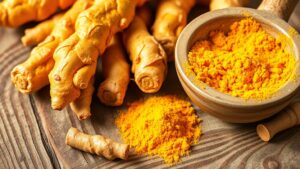Should you be managing inflammation, turmeric could be your new best friend. Its active ingredient, curcumin, packs a serious punch against swelling and pain, assisting you feel better without harsh side effects. Whether it’s stiff joints, a sluggish heart, or even brain fog, turmeric tackles inflammation at the root. And it doesn’t stop there—your skin and overall antioxidant defenses get a boost too. Visualize fewer aches, clearer reasoning, and a body that just works better. Curious how this golden spice can change your health?
Lessens Chronic Inflammation
In case you’re managing chronic inflammation, turmeric—or more specifically, its active compound curcumin—could be a significant turning point. Its anti-inflammatory properties help reduce inflammation by targeting multiple pathways in your body, making it useful for conditions like arthritis and inflammatory bowel diseases.
Studies show curcumin supplements can keep ulcerative colitis in remission and ease joint pain as effectively as NSAIDs, without the side effects. While it won’t stop flare-ups, daily use might lower long-term inflammation.
Adding turmeric to meals or taking supplements could offer steady turmeric benefits, giving your body a natural way to fight persistent inflammation.
Alleviates Arthritis Joint Pain
In the event that chronic inflammation has made your joints stiff and achy, turmeric’s powerhouse compound, curcumin, can offer real relief.
Studies show curcumin’s anti-inflammatory properties help reduce joint pain and stiffness, especially in osteoarthritis. Taking just 1,000 mg daily could ease discomfort as effectively as some medications.
By lowering inflammation, turmeric supplements help improve mobility, letting you move more freely.
The health benefits don’t stop there—regular use may also prevent flare-ups, keeping joints healthier longer.
Should arthritis slow you down, adding turmeric to your routine might make everyday activities feel easier and less painful.
Supports Heart Health by Reducing Inflammation
Because chronic inflammation doesn’t just stiffen your joints—it can also hurt your heart, turmeric’s curcumin steps in as a powerful ally. It fights inflammation and boosts heart health by improving endothelial function, which keeps your blood vessels flexible and lowers cardiovascular disease risk. Curcumin’s antioxidant properties also help reduce oxidative stress, a key player in heart damage. Studies show it can lower cholesterol levels, further protecting your heart. Adding turmeric to your diet or taking turmeric supplements could be a simple way to support long-term heart health.
| Benefit | How It Helps |
|---|---|
| Reduces inflammation | Lowers artery-damaging chronic swelling |
| Improves endothelial function | Supports healthy blood vessel flexibility |
| Lowers cholesterol levels | Reduces plaque buildup in arteries |
| Fights oxidative stress | Shields heart cells from damage |
| Supports overall heart health | Lowers risk of cardiovascular disease |
Protects Brain Function From Neuroinflammation
You may notice turmeric’s active ingredient, curcumin, can sharpen your memory by reducing brain inflammation and oxidative stress.
It also helps protect against neurodegenerative diseases by blocking harmful amyloid plaques linked to Alzheimer’s.
Plus, it boosts BDNF, a protein that keeps your brain cells healthy and supports learning.
Enhances Cognitive Performance
Curcumin, the powerhouse compound in turmeric, doesn’t just fight inflammation—it might give your brain a boost, too.
Studies have shown its anti-inflammatory effects protect against neuroinflammation, a key player in Alzheimer’s disease and memory loss. By reducing inflammation, curcumin could help clear amyloid plaques linked to cognitive decline.
It also boosts brain-derived neurotrophic factor, supporting new neural connections for sharper reasoning. Research suggests taking 90 milligrams twice daily improved memory in older adults over 18 months.
While more studies are needed, the potential benefits for cognitive performance are promising. Your brain could thank you for adding this golden spice to your routine.
Reduces Neurodegenerative Risks
While inflammation plays a role in many health issues, its impact on the brain can be especially concerning—but turmeric’s key compound, curcumin, could help shield against it.
Curcumin supplements tackle neuroinflammation, a driving force behind conditions like Alzheimer’s. Studies suggest they improve memory and combat oxidative stress, which damages brain cells.
The antioxidant properties of curcumin offer protective effects, potentially slowing neurodegenerative diseases. By supporting brain-derived neurotrophic factor, it strengthens cognitive health over time.
Consider it as giving your brain extra armor against decline. Small, consistent doses may be your best defense for keeping your mind sharp as you age.
Supports Brain-Derived Neurotrophic Factor
Because your brain’s health depends on strong neural connections, turmeric’s ability to boost brain-derived neurotrophic factor (BDNF) is a groundbreaking innovation.
Curcumin, its active compound, increases BDNF levels, helping your brain grow new neurons and strengthen existing ones. This supports memory, learning, and overall cognitive health while fighting neuroinflammation and oxidative stress.
Studies show curcumin’s antioxidant properties might even offer protective effects against Alzheimer’s by reducing brain inflammation. Just 90 mg taken twice daily has improved memory in trials.
Promotes Skin Health and Wound Healing
Should you be managing irritated or slow-healing skin, turmeric’s powerful compounds could offer relief by calming inflammation and speeding up recovery. Curcumin, its active ingredient, fights inflammation and free radicals, protecting your skin from damage. At the time applied topically, it boosts cellular regeneration and offers antimicrobial properties, helping wounds heal faster. Skincare formulations with curcumin can also soothe conditions like eczema or acne by reducing redness and irritation.
| Benefit | How It Works | Best Use |
|---|---|---|
| Reduces redness | Curcumin blocks inflammation | Apply as a paste or cream |
| Fights infection | Antimicrobial properties | Use on minor cuts or burns |
| Speeds healing | Promotes cellular regeneration | Mix with honey or aloe |
Regular use keeps skin healthy and resilient.
Enhances Antioxidant Defense Against Oxidative Stress
You can boost your antioxidant enzymes with turmeric, helping your body fight oxidative stress.
Its active compound, curcumin, neutralizes harmful free radicals before they damage your cells.
This kind of cellular protection keeps you healthier and might even slow down aging.
Boosts Antioxidant Enzymes
While oxidative stress can quietly wear down your cells over time, turmeric’s curcumin steps in to strengthen your body’s natural defenses. It boosts antioxidant enzymes like glutathione, which protect your cellular health from free radicals linked to chronic diseases.
Here’s how curcumin works:
- Stimulates production: Curcumin ramps up your body’s own antioxidant enzymes, giving you a stronger shield against oxidative stress.
- Supports glutathione: This powerhouse antioxidant gets a boost, helping to reduce inflammation and protect your heart.
- Fights damage: By neutralizing harmful molecules, it lowers risks tied to heart disease and other conditions.
- Enhances resilience: Regular intake keeps your defenses sharp, so your cells stay healthier longer.
Neutralizes Free Radicals
Because oxidative stress quietly damages your cells over time, curcumin in turmeric steps up as a powerful ally—it directly neutralizes free radicals before they wreak havoc.
These unstable molecules contribute to cellular damage, aging, and chronic diseases, but curcumin’s antioxidant properties help counteract them. By scavenging free radicals, turmeric reduces oxidative stress, supporting skin health and lowering inflammation.
Studies show it even boosts your body’s natural defenses, making it harder for oxidative damage to take hold. Whether you’re fighting aging or protecting against illness, curcumin’s ability to tackle free radicals offers clear health benefits, keeping your cells safer from harm.
Supports Cellular Protection
Turmeric doesn’t just stop at neutralizing free radicals—it also strengthens your body’s natural defenses against oxidative stress.
Curcumin, the powerhouse in turmeric, boosts your antioxidant capacity to protect your cells from damage. Here’s how it works:
- Fights oxidative stress: Curcumin scavenges harmful free radicals, reducing inflammation and guarding cellular integrity.
- Boosts antioxidant enzymes: It activates your body’s own defenses, like glutathione, to combat cellular damage.
- Supports healthy aging: By shielding cells, turmeric could help delay signs of aging and chronic diseases.
- Enhances overall wellness: Regular intake promotes cellular protection, keeping you healthier long-term.
Your cells get stronger, and so do you.





